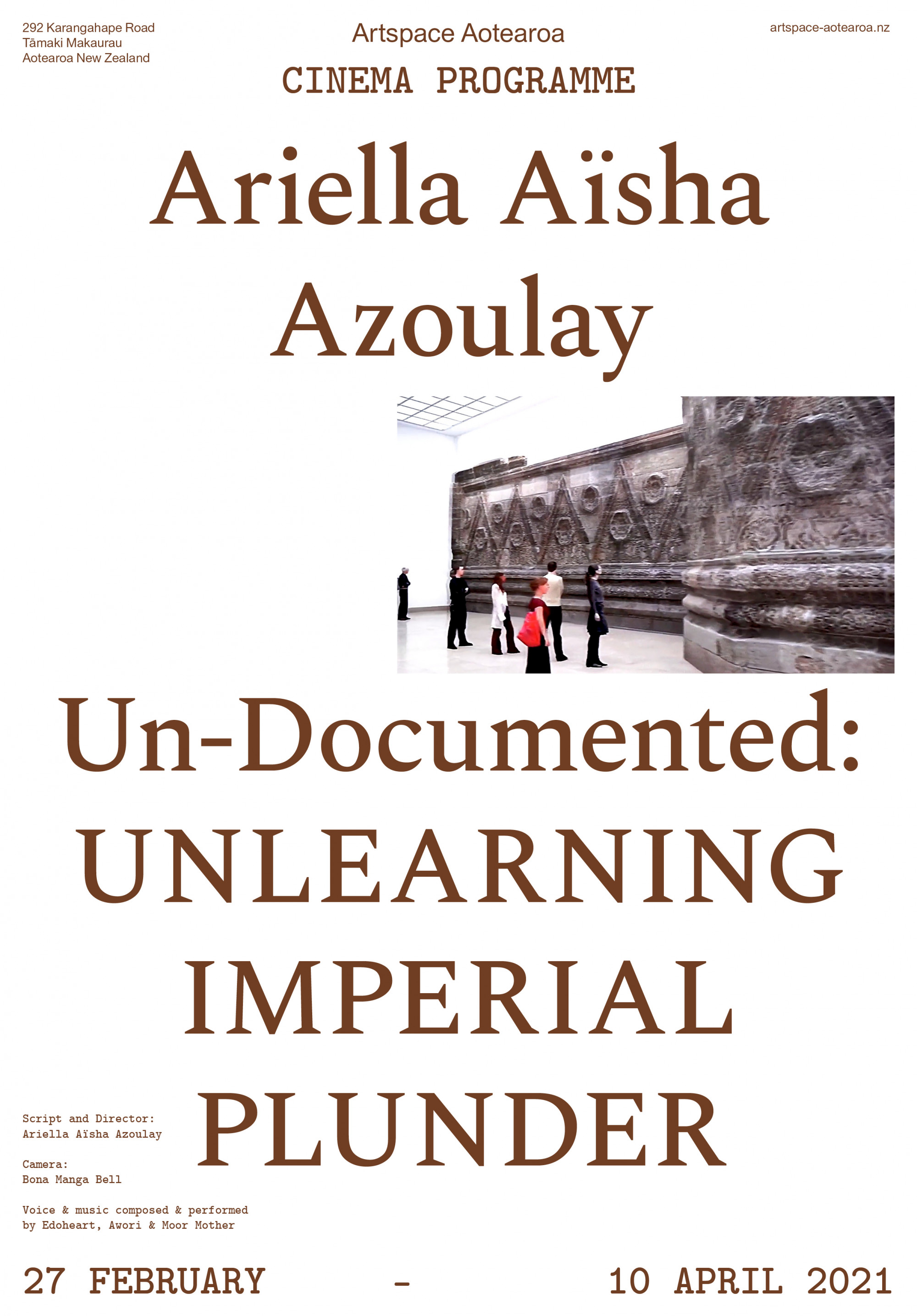Un-Documented: Unlearning Imperial Plunder by Ariella Aïsha Azoulay

Artspace Aotearoa presents the second programme in our new Cinema, Un-Documented: Unlearning Imperial Plunder, the most recent film by theorist, filmmaker and author Ariella Aïsha Azoulay.
Un-Documented: Unlearning Imperial Plunder is committed to showing that statues do not die. This film stands as a rebuttal against the claims made by the film Statues also Die by Alain Resnais and Chris Marker. It’s true that those who plundered millions of objects forced them to exist in isolated museums as showcases condemned to death, but the objects themselves survived, and stand alert in glass cases (and imperial archives) awaiting reunion with their people, scattered across space and time. Plundered objects were uprooted from the communities in which they were made; they were forced to leave the people with whom they shared a world. Their forced migration is parallel to the people who refuse to recognise the legitimacy of imperial borders and seek their place in places where their objects are preserved. Since the exile of these objects, their makers have become endangered. Not that they ceased to produce objects as part of their life, but under the imperial regime, their new objects stood for no objects, which made them objectless of a sort, exposed to different types of violence.
On their quests to ensure their unavoidable reunion with their objects, they are often deemed “undocumented” by a different regime, the one that takes care of people at the borders. As “undocumented” they are denied movement in the world and unduly criminalised for attempts to cross internationally imposed borders. Focusing on plundered objects in European museums and listening to the call of asylum seekers to enter European countries, their former colonising powers, the film defends the idea that formerly colonised people’s rights are inscribed in these objects, that are kept well-documented all these years.
The film is based on the assumption that there is a strong connection between two trajectories of forced migration that are thought as unrelated and are studied separately by scholars from different disciplines in the humanities and social sciences. The first migration is of objects that generated professional care, scrupulous documentation, generous hospitality in museums and archives, and occasional public display. The second migration of people who do not have, never had, or are unable to obtain the documents without which they are banned from access to most kinds of care and hospitality, and from rebuilding their homes and worlds. These objects are those peoples’ documents.
Script and Director: Ariella Aïsha Azoulay
Voice and Music Composed and Performed by: Edoheart, Awori & Moor Mother
Camera: Bona Manga Bell
Ariella Aïsha Azoulay
(born 1962)
Professor of Modern Culture and Media and the Department of Comparative Literature, Brown University.
Her books include:
Potential History – Unlearning Imperialism (Verso, 2019); Civil Imagination: The Political Ontology of Photography (Verso, 2012); The Civil Contract of Photography (Zone Books, 2008); Aïm Deüelle Lüski and Horizontal Photography, Leuven University Press and Cornell University Press, 2013; From Palestine to Israel: A Photographic Record of Destruction and State Formation, 1947-1950, (Pluto Press, 2011); co-author with Adi Ophir. The One State Condition: Occupation and Democracy between the Sea and the River, Stanford University Press, 2012.
Among her potential histories, archives and curatorial work were shown in different places.
Among her films:
Errata (Tapiès Foundation, 2019, HKW, Berlin, 2020), Enough! The Natural Violence of New World Order, (F/Stop photography festival, Leipzig, 2016), Act of State 1967-2007, (Centre Pompidou, 2016, Arquivo Municipal de Lisboa Fotografico, 2020); Enough! The Natural Violence of the New World Order (F/Stop festival, Leipzig, 2016); The Natural History of Rape (Pembroke Hall, Brown University, 2015); The Body Politic [in Really Useful Knowledge, curated by What, How & for Whom / WHW], Reina Sofia, Madrid; When The Body Politic Ceases To Be An Idea, Exhibition Room - Manifesta Journal Around Curatorial Practices No 16 Potential History (2012, Stuk / Artefact, Louven), Untaken Photographs (2010, Igor Zabel Award, The Moderna galerija, Lubliana; Zochrot, Tel Aviv), Architecture of Destruction (Zochrot, Tel Aviv), Everything Could Be Seen (Um El Fahem Gallery of Art).
Among her film essays:
Un-documented: Undoing Imperial Plunder (2019); Civil Alliances, Palestine, 47-48 (2012); I Also Dwell Among Your Own People: Conversations with Azmi Bishara (2004) & The Food Chain (2004).